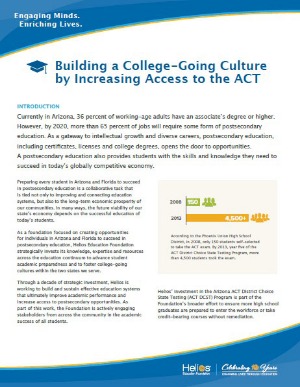Building a College-Going Culture by Increasing Access to the ACT
Overview
According to a recent longitudinal study from the Arizona Board of Regents, 43.5 percent of students who graduated from public high schools in 2005-2006 had not pursued any postsecondary education within six years of graduating. The reasons that students do not pursue postsecondary education vary, but they often center around a weak college-going culture, including inadequate academic preparation, a lack of understanding of the enrollment process and a general unawareness of the economic benefit of college attendance. These students, often called “non college-bound students”, are less likely to take the practical steps needed for college admission and enrollment and, thus, are potentially closing the door on future college and career opportunities.
Another challenge is the lack of academic performance data about the college and career readiness of Arizona students. From 1999 to 2014, Arizona required all of its high school students to take and pass Arizona’s Instrument to Measure Standards (AIMS) test to graduate from high school.
However, AIMS assessed a minimum level of basic skills and provided limited insights into a student’s postsecondary preparedness. Meanwhile, only select students who were already on a college-bound track traditionally took exams, such as the ACT and Scholastic Aptitude Test (SAT), that assess the skills needed to succeed in college and serve an important function in the college admission process. The results from this small group of students presented a distorted snapshot of the overall college readiness of Arizona high school graduates. Thus, it was difficult for teachers, students, families and state leaders to know where the vast majority of high school students fell in being prepared for college and career.
In 2009, Helios Education Foundation began funding the administration of the ACT exam to all juniors in eight Arizona school districts. The ACT was chosen because it is a curriculum-based measure of college readiness, defined as the level of achievement a student needs to enroll and succeed in first-year college courses.
The Arizona ACT DCST Program initially was intended to address two intertwined challenges:
- Limited information was available from the AIMS tests regarding high school students’ readiness for college; and
- Arizona historically has had a low rate of students who are prepared for and pursue postsecondary opportunities.
The premise: By using students’ individual scores and aggregate school- and district-level data and administering the ACT to every student within the participating districts, both the districts and students will be empowered to take action toward increasing college readiness and matriculation. Ultimately, this may lead to district-wide changes to policies and practices in support of college readiness and postsecondary enrollment.


